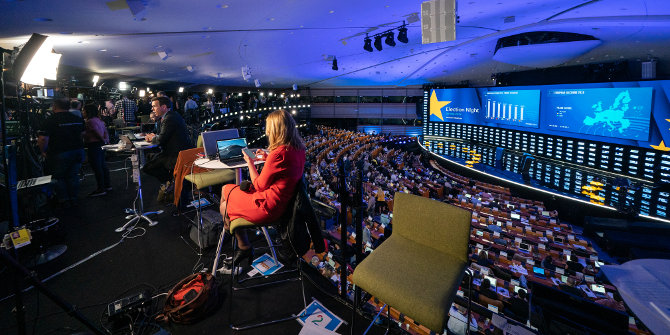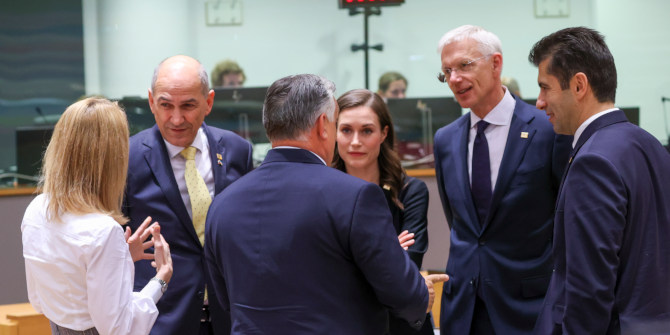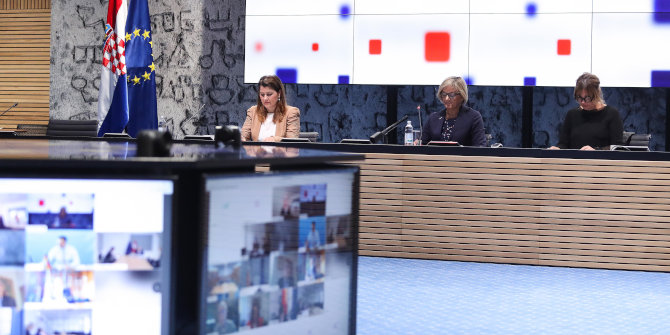 The 2019 European Parliament elections saw support decline for the main centre-left and centre-right groups, while the Greens and some radical right parties were among the main winners. But should we be surprised at radical right parties performing well in European elections? Julia Schulte-Cloos writes that European elections offer some key advantages for the radical right, and their success in European elections also offers a platform to build on their support in subsequent national elections.
The 2019 European Parliament elections saw support decline for the main centre-left and centre-right groups, while the Greens and some radical right parties were among the main winners. But should we be surprised at radical right parties performing well in European elections? Julia Schulte-Cloos writes that European elections offer some key advantages for the radical right, and their success in European elections also offers a platform to build on their support in subsequent national elections.
After the 2019 European elections two things stand out. First, turnout has been higher than in previous European elections. Second, in many countries, mainstream parties have lost at the expense of green and populist radical right challenger parties. Overall, it appears that the populist radical right was able to consolidate their previous European and their most recent national successes. But why have radical right parties proven to be particularly successful in European elections?
European Parliament (EP) elections offer electoral advantages to the radical right as the issue of European integration is particularly salient in EP election campaigns. Anti-European stances serve the substantive demands that populist radical right actors advance as part of their ideological and programmatic core. Together with other nationalist and anti-immigration proposals, they form a coherent set of culturally conservative policy demands.
Issues of supranational integration are debated in close connection to other issues pertaining to cultural or identitarian politics, notably the issue of immigration, the ‘twin issue’ of European integration. Conflicts over these issues form an increasingly relevant dimension of party competition across Europe. Processes of economic, political and cultural globalisation have contributed to the opening up of national boundaries, which has affected citizens’ lives and living conditions across Europe in different ways.
Some citizens feel they benefit from this opening-up of national boundaries and generally appreciate the opportunities that European and international integration and globalisation creates for them. Other citizens, in contrast, feel they lose from this opening-up of national boundaries and perceive the changes generated by European and international integration and globalisation as a risk to them personally and their environment more generally.
A number of scholars argue that related political debates tend to occur along a ‘new’, cultural dimension of political conflict that is distinct from the traditional left-right dimension of politics and cuts across left-right ideological loyalties. The issue of European integration is to be situated as one of the political issues that pertains to the new cleavage. It aligns with other culturally conservative proposals and the populist radical right’s substantive demands. During the EP election campaign, these issues were highly salient and the radical right clearly benefits from this increased salience of their core programmatic demands.
The complex and technocratic character of multi-level governance
Next to the salience of the programmatic demands advanced by the radical right during EP campaigns, the issue of European integration and the complex character of technocratic multi-level governance also offer opportunities for the discourse of the radical right. The implementation of technocratic policies at the EU level, the EU’s complex multi-level decision-making structure, and the image of an elitist and distant European bureaucracy in Brussels make the EU an ideal target for the radical right’s message.

Election night at the European Parliament on 26 May 2019, Credit: CC BY 4.0: © European Union 2019 – Source: EP
European politics and European policy-making have a history of creating perceptions of abstract remoteness among citizens. In the early phases of European integration, the often complex decisions taken at the European level hardly touched upon citizens’ everyday lives in a visible, perceptible way. This has changed at least in the wake of the debates over the single currency. Multi-level governance in the EU, however, has largely maintained its technocratic character and the policy process often leads to procedural agreement among the EU’s members, which is at odds with the style of policy-making envisioned by the populist right.
The recent experience of the financial crisis across Europe has only entrenched this perception of elitist, technocratic EU decision-making. This has offered a discursive opportunity for populist radical right actors, who appeal to voters by promoting an anti-elitist style of decision-making that aims to give control back to citizens and the nation state.
Beneficial institutional features of EP elections
Last, radical right parties enjoy advantages in EP elections because of the institutional set-up of these elections. While the decision-making authority of the European Parliament has grown over recent decades, there is no government formation at stake in the elections. As such, voters are more likely to ‘vote with their heart’ and cast a vote that closely matches their policy preferences, disregarding any strategic calculations over whether their chosen party will be part of a government.
Other voters use the supranational elections instrumentally to express dissatisfaction with their national governments. The electoral system applied in the EP elections further increases incentives to vote non-strategically. As of 1999, all member states have to apply a system of proportional representation in the elections, rendering the contest more permissive than in some countries’ national elections in which the electoral formula contains majoritarian elements.
The effect of EP elections on the rise of the radical right
One final question is whether the success of radical right parties in European elections helps these parties to grow their support in subsequent national elections. In a recently published study, I show that EP elections do indeed foster the rise of the radical right at the national level.
I assessed this question by taking advantage of the stable timing of EP elections, which have been held every five years since the first direct elections in 1979. In contrast, national electoral cycles have varied considerably during this period across the member states. Usually, national issues tend to dominate the agenda in national elections, rather than the issue of European integration. Yet when European and national election campaigns occur around the same time, the issue of European integration becomes more prominent on the national agenda. European elections disrupt the usual national agenda and add some salience to the otherwise ‘muted’ issue of European integration. This works in favour of the radical right given the issue of European integration fits with their core demands and anti-elitist campaigning style, as outlined above.
Thanks to European Parliament elections, radical right parties are therefore becoming more visible in the national discourse of member states: the media is covering their success, voters are becoming more aware of their platforms, and mainstream parties are starting to treat them as more serious competitors. This might set in motion a different political dynamic not only in changing the way mainstream parties react, but also in changing the way voters perceive of the electoral viability of these challenger parties and the social acceptance of their radical policy positions.
Please read our comments policy before commenting.
Note: This article gives the views of the author, not the position of EUROPP – European Politics and Policy or the London School of Economics.
_________________________________
 Julia Schulte-Cloos – European University Institute / University of Vienna
Julia Schulte-Cloos – European University Institute / University of Vienna
Julia Schulte-Cloos is a researcher at the European University Institute in Florence and at the Department of Government at the University of Vienna. Her research interests include comparative politics, electoral behaviour, European integration and the populist radical right. She tweets @jschultecloos





